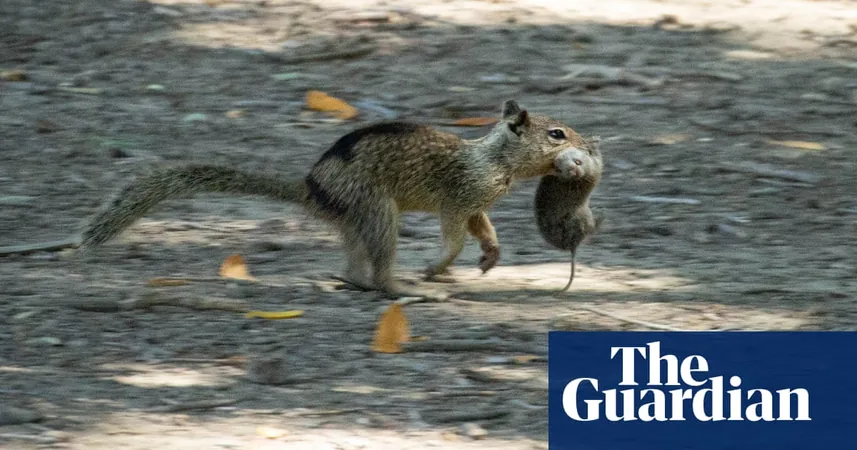
Squirrels in Predator Mode: Ground Squirrels Surprising Scientists by Hunting Voles!
2024-12-18
Author: Ming
Introduction
In a fascinating twist that has left researchers astounded, California ground squirrels have been observed actively hunting and consuming voles—behavior that defies their previously understood dietary habits.
Once considered primarily herbivorous creatures indulging in seeds, nuts, and fruits, these squirrels exhibit a ferocious side, evidenced by their hunting techniques which involve decapitating their prey and tearing flesh from the torso.
Research Findings
Dr. Jennifer Smith, an associate professor of biology at the University of Wisconsin, Eau Claire, and the lead author of the study, expressed her excitement: “This is incredibly exciting because this is the first time for this species that we’ve documented active hunting from start to finish.”
The research team initially set out to observe typical foraging behaviors, but what they discovered during the summer of 2024 was entirely unexpected. Over an eighteen-day period, they documented 74 instances of ground squirrels hunting or eating California voles, with at least 27 different squirrels participating in the behavior.
While these squirrels have shown occasional tendencies to scavenge on small mammals, their newfound predatory streak is a significant departure from established norms.
Behavior Observations
Notably, the team observed both adult and juvenile squirrels—male and female—hunting voles alone and even engaging in competition over dead voles.
Implications of Findings
This surprising behavior aligns with a notable spike in the population of California voles, as reported by citizen science data.
Dr. Smith suggests that the sudden abundance of this food source has created a "novel dietary niche" that these squirrels have adeptly taken advantage of. “It seems that these squirrels are just opportunistic,” she remarked, hinting at the possibility that they might learn these new hunting behaviors from one another.
Reevaluation of Dietary Habits
Experts are now reevaluating the dietary flexibility of California ground squirrels. This discovery positions them as opportunistic omnivores rather than strictly herbivores and suggests that their adaptability could be crucial for survival, especially as they face challenges from climate change and encroaching human activities.
Expert Insights
Cory Williams, an assistant professor in the Department of Biology at Colorado State University, who was not part of this study, addressed the paradox of ground squirrels, which are diurnal, preying on nocturnal voles.
He emphasized that these predatory encounters may only happen during population booms of voles, making the phenomenon a rare but fascinating spectacle.
Ecological Impact
The implications of this research extend beyond mere curiosity. California ground squirrels play a pivotal role in the ecosystems of the region, serving as a primary prey species for various predators.
Should their populations thrive, it could have profound positive effects on other species at risk, potentially contributing to biodiversity and ecological health.
Conclusion
Stay tuned as we uncover more secrets of nature's hidden behaviors and what they mean for the future of wildlife!




 Brasil (PT)
Brasil (PT)
 Canada (EN)
Canada (EN)
 Chile (ES)
Chile (ES)
 España (ES)
España (ES)
 France (FR)
France (FR)
 Hong Kong (EN)
Hong Kong (EN)
 Italia (IT)
Italia (IT)
 日本 (JA)
日本 (JA)
 Magyarország (HU)
Magyarország (HU)
 Norge (NO)
Norge (NO)
 Polska (PL)
Polska (PL)
 Schweiz (DE)
Schweiz (DE)
 Singapore (EN)
Singapore (EN)
 Sverige (SV)
Sverige (SV)
 Suomi (FI)
Suomi (FI)
 Türkiye (TR)
Türkiye (TR)